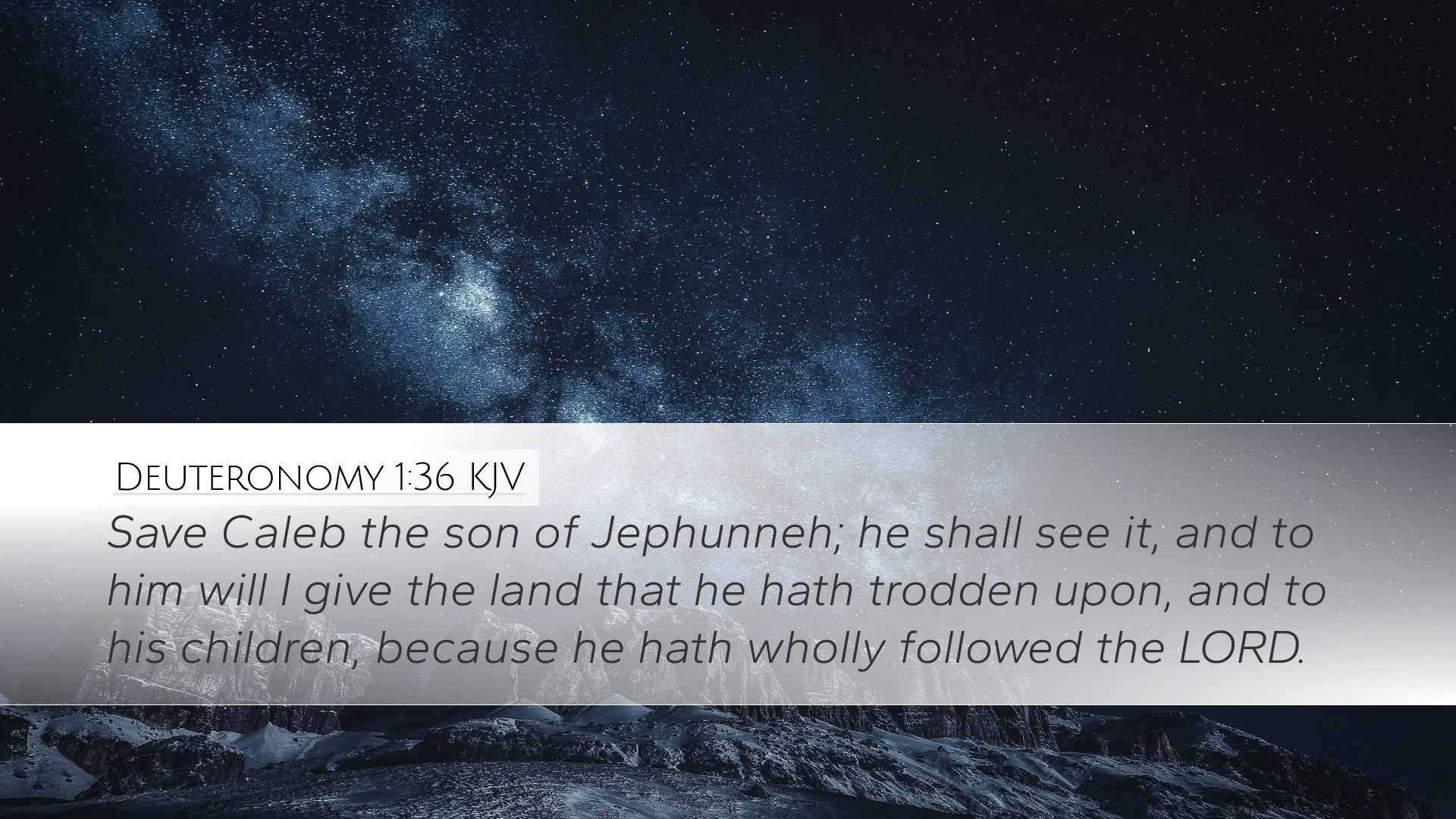Commentary on Deuteronomy 1:36
Verse: "Except Caleb the son of Jephunneh; he shall see it, and to him will I give the land that he hath trodden upon, and to his children, because he hath wholly followed the LORD." (Deuteronomy 1:36)
Introduction
This verse encapsulates a significant moment in the history of Israel as they stood on the brink of entering the Promised Land. In the broader context of Deuteronomy, Moses recounts the journey of the Israelites and highlights the consequences of their disobedience. It serves both as a lesson in faithfulness and a promise of reward for those who remain steadfast in their trust in God.
Insights from Public Domain Commentaries
Matthew Henry's Commentary
Faithfulness Rewarded: Matthew Henry emphasizes Caleb's unwavering faith in contrast to the doubts expressed by the majority of the spies sent to explore Canaan. His faithfulness is prominent, and it is noted that God honors those who fully follow Him. Henry articulates that Caleb's devotion and reliance on God's promises set him apart, allowing him to be rewarded with a significant inheritance in the land.
Implications for Faith: Henry connects this promise to the broader theme of spiritual inheritance. He points out that Caleb serves as an example for believers today; those who trust in the Lord are assured of entering into His blessings. The moral is clear that total commitment to God leads to divine favor, a theme that runs throughout Scripture.
Generational Blessings: The promise made to Caleb extends to his descendants, highlighting a biblical principle where the faithfulness of one can have profound implications for future generations. This aspect invites contemplation on the legacy of faith, encouraging parents and leaders to cultivate a life that will inspire future generations.
Albert Barnes' Notes
Caleb's Role and Rejection of Doubt: Barnes elaborates on the significance of Caleb and the context of his faith. He notes that Caleb was one of the only two individuals who trusted God’s capability to lead Israel into Canaan, despite the overwhelming fear among the people. Barnes highlights that this verse illustrates God's justice – the steadfastness of Caleb earns him not only the promise of land but also a commendation that resonates through ages.
Contrast with Israel's Unbelief: In Barnes' view, the mention of Caleb in this verse serves to contrast with the overall unbelief of the Israelite community who rebelled against God. Barnes emphasizes that it was their refusal to trust in God’s plan that led to a forfeiture of entering the Promised Land, portraying the dire consequences of collective doubt against individual faithfulness.
Theological Significance: Barners’ analysis further explores the theological significance of the inheritance Caleb receives. He posits that this reward illustrates the divine principle of election and grace; God’s choosing of Caleb as a recipient of this promise despite the failures of the broader community reflects God’s mercy and sovereign will in calling forth His own.
Adam Clarke's Commentary
Historical Context and Application: Clarke gives a historical backdrop, noting that Caleb's designation as a leader and his experiences as a spy shape his narrative. He points out that Caleb’s experiences should encourage current believers to remember that past failures and collective sins do not negate the possibility of individual faith and victory. Clarke emphasizes the relevance of this theme to contemporary church life, highlighting how the faith of one can inspire many.
Analysis of the Land Promise: Clarke also provides an exposition on the specific mention of the land Caleb had trodden upon. This is understood to signify not just possession but the promise of God that what has been surveyed and walked upon in faith is sanctified and set apart for reward. He notes this mirrors the promises made to believers regarding the inheritance they shall receive — it’s tangible and assured for those who remain faithful.
Lasting Legacy of Caleb: Clarke’s commentary highlights Caleb's legacy, particularly in how his faithfulness earns him a secure place in the narrative of salvation history. He urges readers to see Caleb not merely as a historical figure but as a prototype of obedience and faith—qualities that are essential for God’s people. This legacy illustrates a powerful message about the nature of reward and divine memory; God does not forget those who diligently seek Him.
Theological Themes
- Faith and Obedience: This verse emphasizes the foundational Christian themes of faith and obedience. It illustrates how genuine faith results in divine favor and blessing.
- Generational Consequences: The Biblical theme of blessings flowing to descendants underscores the importance of living a life of faith which paves the way for future generations to inherit God’s promises.
- Divine Justice and Mercy: God's discernment in rewarding Caleb while punishing the unfaithful reflects God’s justice intertwined with His mercy, where faithfulness is sovereignly rewarded.
- Legacy of Faith: The legacy of Caleb challenges believers to consider their spiritual footprints and the impact of their faith on the lives of those who come after them.
Conclusion
Deuteronomy 1:36 serves not only as a historical recounting of Israel’s journey into the Promised Land but also as a profound lesson on faith, integrity, and the assurance of God’s promises. As pastors, students, and theologians, the insights gathered from these public domain commentaries encourage a deeper reflection on our individual and collective journeys of faith. Caleb stands as a beacon of hope, illustrating that total commitment to God leads to a rewarding, impactful legacy.


